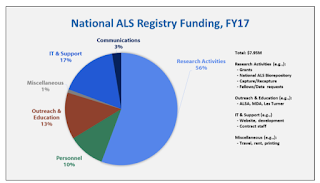 And a core decision in moving ahead with any project is to weigh the value proposition.
And a core decision in moving ahead with any project is to weigh the value proposition. You clearly can't evaluate the cost and value without knowing the costs.
A few months ago I started thinking about how we might look at the value proposition of the many functions of the CDC ALS Registry so that we could perhaps identify the high value, low cost features (that are obvious keepers) versus the low value, high cost functions (that might be good candidates to pare back).
As a taxpayer and ALS advocate, I take the value proposition and the importance of the CDC ALS Registry mission seriously.
In January, I asked the head of the CDC ALS Registry how much was spent on research grants in the most recent fiscal year available. He referred me back to a pie chart that I had forgotten from the last annual meeting --
But that doesn't really break out the granted research dollars for a year. It glumps a lot of functions together.
I asked again, and he shared that the average research grant is $400,000. That's not really helpful to try to look at a normalized year of expense data.
I asked again if the last annual spending on external research grants was easy to provide, and I was referred to the Freedom of Information Act (FOIA) office.
Since I was going to have to submit a FOIA request to get some numbers that I thought were probably pretty easy to provide, I asked for estimates of the annual expenditures for several CDC ALS Registry functions for the most recent fiscal year available --
- Research grants
- The basic data mining
- Self-enrollment portal and support and processes
- Annual MMWR report
- Annual meeting
- Risk factor surveys and reports
- Continuing education
- Biorepository
- Research notification
The National Center for Environmental Health / Agency for Toxic Substances and Disease Registry (NCEH/ATSDR) performed a search for records, as indicated above. In their response, the National ALS Registry appreciates your inquiry regarding its FY 2017 budgetary activities. As was previously conveyed to you by email on January 23, 2019 from Dr. Kevin Horton—National ALS Registry Program Manager—the average grant for FY 2017 was approximately $400K/year per institution based on a 3 year cycle (Sept 2016 – Sept 2018). Regarding the subsequent, listed program expenditures, there is no direct way to accurately access costs for these specific activities (e.g., data mining, MMWR reports, and research notification) as they are largely elements of daily staff/program duties. The FY 2017 funding pie chart included in your request, represents the most accurate information available.How can you manage a $10,000,000 annual budget on a project that has consumed $88,000,000 without knowing approximately how much was consumed by each function in your last year of actual data? How can you decide priorities when you don't know the relative costs of functions? How can you make good decisions?
How?

